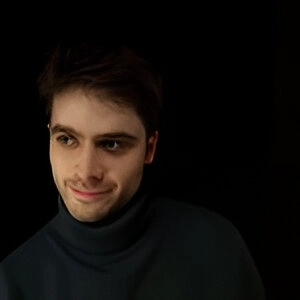An assistant professor at Arizona State University in the U.S., Brian K. Goodman published his first book earlier this year, The Nonconformists: American and Czech Writers across the Iron Curtain, a treasure trove of information and insights for anyone passionate about literature, human rights, and countercultures of political dissent and creative resistance.
The book's topics range from Kafka’s influence on an American audience in the early 20th century to Beat chief guru Allen Ginsberg’s historic stay in 1960s Czechoslovakia, and the role played by a network of celebrated writers in distributing major works from one side of the Iron Curtain to the other; to the intricate personal and creative relationships between giants of world literature like Philip Roth, John Updike, Ivan Klíma or Milan Kundera.
Expats.cz caught up with Goodman to discuss how, overcoming decades of ideological division, political polarization, and cultural censorship, the conversation between Czech and American writers was key in defining an idea of dissent that continues to resonate today.
What pushed you to write a book on this topic?
When I was a Beat-crazy college student in California, almost twenty years ago, I visited Prague and somehow got my hands on photocopies from Allen Ginsberg’s secret police file. I became obsessed with finding out the full story behind Ginsberg’s election as “King of May” (Král majáles) and his subsequent expulsion from Czechoslovakia in 1965. Years later, I realized that the Ginsberg story was just one part of a much wider history of literary dissent across the Iron Curtain, spanning decades and involving some of the most celebrated American and Czech writers of the Cold War era.
Do you have any academic or personal relationship with the Czech Republic?
There is a distant personal connection. My mom’s side of the family emigrated from Bohemia to the Chicago area at the end of the 19th century, decades before the establishment of the First Czechoslovak Republic in 1918. My grandpa still remembered scraps of Czech from his “Bohunk” childhood in Chicago. As a result, I’d always been curious about Prague, and the tumultuous 20th-century Central European history my family had managed to avoid. For what it’s worth, this counterfactual impulse also drew many American writers with distant family connections to the region.
In your book, Kafka is the overarching “spectral” figure connecting the dots, used and misused by most major ideological and cultural movements throughout the 20th century. Are we past the “Kafkaesque craze” today, and how does his writing remain relevant for contemporary dissident cultures?
There is a central irony here: it was precisely these political uses and misuses that helped create a Kafka craze during the early Cold War years. As I show in the book, the idea of the “Kafkaesque” was a product of mid-century political and artistic debates, particularly on the left. Even if this idea amounted to a distortion of Kafka’s own elusive intentions, I don’t think this is such a bad thing. Kafka’s books found their way into the hands of millions of readers, who could then judge for themselves. The dissident image of Kafka has since spread around the world, influencing literary nonconformists from Latin America to Asia. In 1947, the American critic Edmund Wilson predicted that “Kafkaesque” would become “a permanent word.” I don’t believe in permanent words, but so far, he’s been proven right.
Did you visit the Czech Republic for your research?
Yes, the book required many visits to the Czech Republic, and often for months at a time. First, there was summer language school in Brno, and then there were several rounds of archival research in Prague. But the highlight was my year of writing in cafes in and around Holešovice. My apartment was right across from Stromovka, with a view of the old exhibition grounds where Ginsberg was elected King of May in front of over 100,000 Czech students. There are worse reasons to write a book than to spend time in Prague.

Your essay came out at about the same time as the death of Milan Kundera, who was one of the last major authors still alive mentioned in your book. The end of an era?
A number of the central figures in this history passed away while I was working on the book, including Václav Havel, Philip Roth, Josef Škvorecký, and now Kundera. I tried to write a kind of obituary for Kundera this summer, but I haven’t found anyone willing to publish it yet. Maybe this is itself a kind of answer to your question. In the 1970s, Kundera worried that his writing would be turned into politicized kitsch when it was received in the West. And, just like Kafka’s writing, it was. This helped him reach an enormous audience, influencing countless contemporary novelists. At least for a time. As he eventually acknowledged in a letter to his friend Philip Roth, “Kitsch is the stopover between being and oblivion.”
Kafka, Havel, Kundera... Your book is full of examples of Czech authors misinterpreted in the West throughout communism. Did the end of the Cold War allow for a more honest, ideology-free reading of these authors?
I’m not sure I believe such a reading is entirely possible. For Kundera, who largely turned away from Central European politics in his writing and composed his novels in French in the 1990s, I think this came at an artistic cost. Havel is a very interesting counterexample. It seems to me that Havel’s writing has been enjoying a minor renaissance in the United States since 2016, and I think that’s in part because he has been claimed by intellectuals across the ideological spectrum, spanning heterodoxies of both the liberal left and populist right. Timothy Snyder, Pankaj Mishra, and Rod Dreher can’t all be right about the “Power of the Powerless,” but their uses and misuses of Havel have kept him relevant, perhaps even vital in our own time.
If you had to choose a few books to understand how Czech and American authors mutually influenced each other during that specific period, which ones would you recommend?
I’ll offer three pairings. First, two hybrid novels, The Cowards and The Engineer of Human Souls, both by the Czech-Canadian writer Josef Škvorecký, who was himself a central conduit for American and Czech writing across the Iron Curtain.
Second, Philip Roth’s novella The Prague Orgy and Arthur Miller’s play The Archbishop’s Ceiling, both perversely reflect their authors’ real-life experiences in Czechoslovakia after the Soviet-led invasion of 1968.
Third, to read alongside my book, Between Two Fires: Transnationalism and Cold War Poetry by the Prague-based poet and scholar Justin Quinn. Justin is a wonderful friend and a big inspiration behind my book.
Do you follow the contemporary Czech literary scene? If so, do you have favorite authors or books that could resonate with Western readers?
I’m always eager to know what the contemporary translator Alex Zucker is working on next. Zucker’s translations of Jáchym Topol helped bridge the pre- and post-1989 eras of Czech literature for an English-language readership. Most recently, he has completed an award-winning translation of The Lake by Bianca Bellová, which I can’t wait to read. But first I need to finish devouring the works of Janet Malcolm, the Prague-born and U.S.-based literary journalist who recently passed away after a long career writing for the New Yorker. I wish I’d found a way to include her in my book!
Many Czech authors mentioned in your essay were not comfortable with the West's image of the "dissident intellectual" ascribed to them. Why is that?
Of course, as we’ve discussed already, there is the problem of political and ideological misreading. But I think the deeper answer can be found in the etymology of the word itself. The term “dissident” developed out of a Latin word (dissidēr) meaning, literally, “to sit apart.” Writers like Havel were cut off from their primary audiences inside Czechoslovakia after 1968. Foreign translations, along with solidarity from Western writers, could only go so far in helping banned Czech writers overcome their sense of cultural isolation. The term “dissident” didn’t make matters any easier at home.
What does it mean to be a dissident in a free, democratic society, or is it even possible?
In the United States, especially after the 1960s, there have been two dominant views on dissent. On the one hand, dissent has become a kind of national fetish. At times, we have seen this with so-called “resistance discourse” since the election of Trump in 2016. The second view is more cynical: in a democratic, capitalist society, dissent is much too easily commodified or co-opted by elite power and then contained. Everything goes, nothing matters. My view, however, is more Havelian: the “social effects” of any act of artistic or cultural dissent are necessarily “incalculable, unpredictable, hidden, and indirect.” Everything goes, and everything still matters. We just can’t know how in advance.












 Reading time: 7 minutes
Reading time: 7 minutes 



























